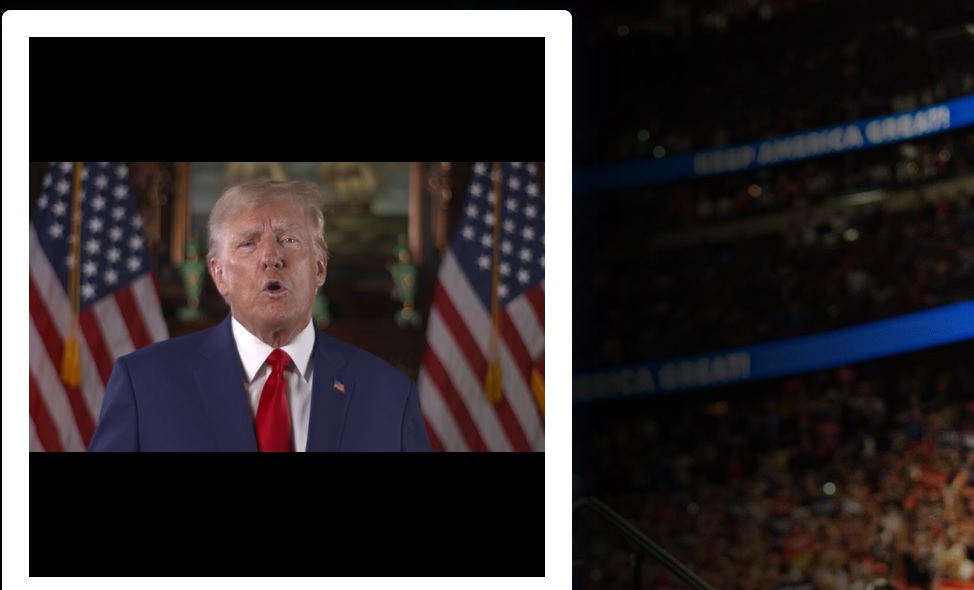Donald Trump Issues Anti-Online Content Moderation Manifesto
Says if he becomes president, expect investigations, prosecutions of depraved media, online tyrants, deep-staters and others

The smarter way to stay on top of the multichannel video marketplace. Sign up below.
You are now subscribed
Your newsletter sign-up was successful
Former President Donald Trump has issued a manifesto against online content moderation, pledging if he is re-elected to try and eliminate efforts to weed out misinformation and disinformation, and support allowing adults (over 18) to opt out of any content moderation of social media platforms whatsoever.
That came in a six-minute video Trump emailed to supporters Friday (December 23).
Trump called it a “plan to shatter the left-wing censorship regime,” which he said was composed of “a sinister group of deep state bureaucrats, Silicon Valley tyrants, left-wing activists and depraved corporate news media” that he said had been conspiring “to manipulate and silence the American people.”
Trump appeared to have been fired up by Elon Musk’s release of Twitter documents related to the company's efforts to weed out misinformation and disinformation, which Trump alluded to as “bombshell reports.”
Also: Donald Trump Threatens More Lawsuits Against Media
He called those trying to prevent online disinformation a cartel that had collaborated to suppress vital information on “everything from elections to public health,” a cartel he said had to be “destroyed.”
Trump said that if he is re-elected he would issue executive orders banning any government effort to work with online platforms “to impede lawful speech.” He said no federal money would be used to help label speech as misinformation or disinformation.
The smarter way to stay on top of the multichannel video marketplace. Sign up below.
Trump was banned from Twitter for spreading false information about widespread election corruption.
He said he launched a hunt to find and fire any government official who had “engaged in domestic censorship,” whether directly or indirectly.
He said he would order the Department of Justice to launch an investigation of what he called the “online censorship regime” and prosecute a host of civil, criminal or constitutional “offenses.”
Trump said he would ask Congress to revise Section 230, which currently provides online platforms immunity from civil prosecution for third-party content. He said to get Big Tech out of the censorship business, that immunity should only apply if they meet "high standards of neutrality, transparency, fairness and nondiscrimination."
“We need to break up the entire toxic censorship industry that has arisen under the false guise of tackling so-called mis- and disinformation,” including by refusing to fund any nonprofit or university trying to identify and weed out misinformation and disinformation. He said any university found to be doing so should not get federal funding and their students should not get federal loans for at least seven years.
Trump suggested that online platforms were being “infiltrated” by former government deep-staters, including intelligence officials, so he would call for a seven-year period before any employee of various security agencies could take a job at “a company possessing vast quantities of user data.”
He also called for a digital bill of rights, but one very different from the kind Democrats have long espoused. He said that would include a right to due process, which meant government officials would need a court order to take down online content, “not send information requests, much as the FBI was sending to Twitter.”
Trump said all users over 18 should have “the right” to “opt out of all content moderation entirely” and receive an “unmanipulated stream of information if they so choose.” ■
Contributing editor John Eggerton has been an editor and/or writer on media regulation, legislation and policy for over four decades, including covering the FCC, FTC, Congress, the major media trade associations, and the federal courts. In addition to Multichannel News and Broadcasting + Cable, his work has appeared in Radio World, TV Technology, TV Fax, This Week in Consumer Electronics, Variety and the Encyclopedia Britannica.

